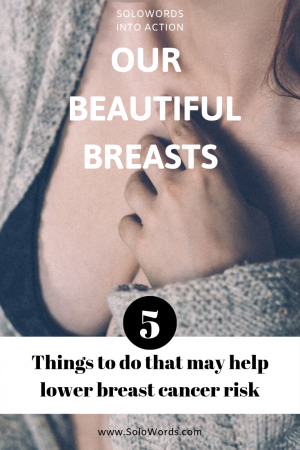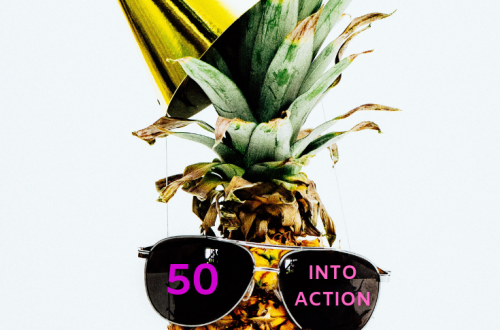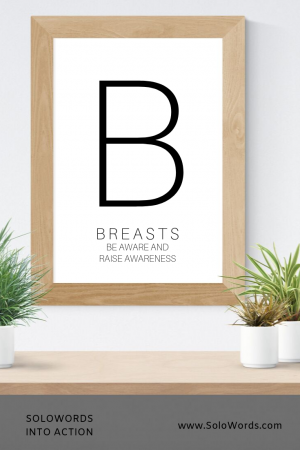
Our beautiful breasts: 5 things to do that may help lower breast cancer risk
Our beautiful breasts, those which years ago represented that we were going from being little girls to becoming “señoritas” or young ladies. The same breasts which make us look and feel sexy. But most importantly, the miracle breasts which feed our babies and give us the most wonderful connection with them.
These beautiful breasts are the victims of a terrible monster that is out there. The monster that killed my dear sister and has killed millions of women worldwide. The monster we sometimes don’t pay attention to because we prefer to think that it won’t get us. However, like it or not, the truth is that the monster is out there, maybe closer than we think and we don’t know if our beautiful breasts will be their next victim.
We all know the name of that monster: Breast Cancer. It attacks not only the beautiful breasts of its victims but also has the power to mess up their minds. It can be a slow and frightening process where each day, the victims fight a mental and physical battle, always trying to keep high the hope of winning.
Breast cancer awareness month:
So here we are in October which has been proclaimed “National Breast Cancer Awareness Month” which in my opinion is too short of a period to attack and increase awareness about this monster. In reality, every month, every day and every minute should be Breast Cancer Awareness.
The battle that my sister heroically fought impacted me in many different ways and made this post a hard one to write. However, I feel it is my obligation as a sister, aunt, daughter, and woman to try to make each of us aware of this monster. Unfortunately, it will probably get to us directly or indirectly, and it is our responsibility to be prepared. There is a popular phrase that says, “knowledge is power.” Well, in this case, we have to know as much as we can about this monster that is threatening us so we can prevent any encounter or get prepared to fight it if we need to.
Let me clarify something. This post is for all of us who think we are healthy to open our eyes and make us aware of a real threat. The intention of this post is to warn each of us and to make us reflect about the things we do or can do to help prevent what my sister went through. Breast cancer is not a topic that can be sugar-coated, so here are some important facts to reflect on:
Breast Cancer Facts:
Here is a compilation of the most important facts about breast cancer in the United States for 2019 (Source: breastcancer.org and cancer.org)
- About 1 in 8 U.S. women (about 12%) will develop invasive breast cancer throughout her lifetime.
- About 268,600 new cases of invasive breast cancer will be diagnosed in women
- About 62,930 new cases of carcinoma in situ (CIS) will be diagnosed (CIS is non-invasive and is the earliest form of breast cancer)
- About 41,760 women will die from breast cancer
- As of January 2019, there are more than 3.1 million breast cancer survivors in the United States. This includes women still being treated and those who have completed treatment.
- About 2,670 new cases of invasive breast cancer are expected to be diagnosed in men in 2019. A man’s lifetime risk of breast cancer is about 1 in 883.
- For women in the U.S., breast cancer death rates are higher than those for any other cancer, besides lung cancer.
- Besides skin cancer, breast cancer is the most commonly diagnosed cancer among American women. In 2019, it’s estimated that about 30% of newly diagnosed cancers in women will be breast cancers.
- In women under 45, breast cancer is more common in African-American women than white women. Overall, African-American women are more likely to die of breast cancer. For Asian, Hispanic, and Native-American women, the risk of developing and dying from breast cancer is lower.
- A woman’s risk of breast cancer nearly doubles if she has a first-degree relative (mother, sister, daughter) who has been diagnosed with breast cancer. Less than 15% of women who get breast cancer have a family member diagnosed with it.
- About 5-10% of breast cancers can be linked to gene mutations inherited from one’s mother or father. Mutations in the BRCA1 and BRCA2 genes are the most common. On average, women with a BRCA1 mutation have up to a 72% lifetime risk of developing breast cancer. For women with a BRCA2 mutation, the risk is 69%. Breast cancer that is positive for the BRCA1 or BRCA2 mutations tends to develop more often in younger women. An increased ovarian cancer risk is also associated with these genetic mutations. In men, BRCA2 mutations are associated with a lifetime breast cancer risk of about 6.8%; BRCA1 mutations are a less frequent cause of breast cancer in men.
- About 85% of breast cancers occur in women who have no family history of breast cancer. These occur due to genetic mutations that happen as a result of the aging process and life in general, rather than inherited mutations.
- The most significant risk factors for breast cancer are gender (being a woman) and age (growing older).
- Having dense breast tissue makes it harder for radiologists to see cancer. Cancer.org says “Women who have dense breast tissue seem to have a slightly higher risk of breast cancer compared to women with less dense breast tissue.” You can also read more about breast density at Susan G Komen
5 things we must do that may help lower breast cancer risk:
We don’t know if we will have to fight this monster inside us at some point in our lives or if we will have to fight it by supporting one of our dearest ones. The only thing we know right now is that our beautiful breasts are at risk and we should take this threat very seriously.
Breast cancer can be linked to many factors, and unfortunately, we can’t control all of them. However, there are some things we can do that can help us lower our breast cancer risk or at least detect the monster in its early stage.
1. Educate ourselves and others:
There is plenty of information about breast cancer. Take the time to read about breast cancer risk and prevention at cancer.org
2. Work on healthy habits:
This is not only for our breasts but for our whole body. Trying to eat balanced food, limit processed and fast food, limit or avoid alcohol, stop smoking, getting and staying at a healthy weight and exercise regularly are just some examples. Read “Can I lower my risk of Breast Cancer” at cancer.org
3. Know our breasts and do frequently self-examinations:
Look at them, touch them, and record every single detail about them so we can notice any change if it happens. For example: swelling, soreness or rash in breast or nipple, dimpling or puckering of the skin, change in size or shape, nipple becomes flat or inverted, having nipple discharge, persistent pain in one spot, having bumps or lumps that feel hard.
4. Getting our mammogram done and any other screening test recommended by our doctor:
Follow American Cancer Society guidelines about mammograms. Getting regular mommograms can help find breast cancer at an early stage. Remember that years can pass without having any symptoms. Check also for other and more personalized screening tests.
5. Talk with our doctor and understand the results:
Talk with our doctor about the results and our breast cancer risk. There are, available online, several breast cancer risk assessment tools like the one from the National Cancer Institute. Ask our doctor about it, especially if we have a family history and/or dense tissue. Also evaluate with our doctor
Fighting the monster:
It is immensely hard for me to try to describe my sister’s battle from beginning to end. I live around 2050 miles away from where she lived, so there were thousands of moments I couldn’t be there to hug her during those difficult times. However, even with that distance between us, we were very close. Hours and hours of phone conversations, texting, and whenever possible getting together. Through her battle, I realized how hard is fighting the monster not just for the victim but for the whole family. I realized that every person that fought or is still fighting the monster is a war hero of her own battle. A battle that nobody else understands unless she/he is a hero too.
I am thankful I could be with my sister for the last three weeks of her heroic battle to hug, help, support, care, and demonstrate my unconditional love to her and her family. She will be forever my hero that I will never forget. However, there is also one thing that we should never forget: the lessons we learn during that difficult and emotional process of fighting and losing our dear ones.
Lessons I learned from my sister’s battle:
It is so ironic that we, human beings, only can learn the best lessons of life when experiencing very hard and difficult situations. It is even more ironic that time always tries to make us forget the lessons we learned in such a hard way. Right after my dear sister passed, I decided to write what I learned during those difficult times and made a promise to myself to never forget those lessons. Guess what? I have already forgotten to put in practice some of them, I am a human being, but I am alive and every new day is a new opportunity to start again:
- God first. Keep a good connection with God. He is the only one who can give us interior peace.
- Nothing like unconditional family love. It doesn’t matter how long we haven’t talked to them or how far we live from each other, family is family.
- Always start and finish a conversation complementing or thanking the other person for anything relevant to him/her.
- Do not think only about ourselves and our problems. There are a lot of people that have more significant problems than us.
- Live the present: “here and now” is what we have. Hug, kiss, give thanks, say sorry, and say I love you today. We don’t know if we have tomorrow.
- Help: The best satisfaction in life is to know that we are helping someone.
- Put 100% in everything we do, mostly when we are helping someone.
- When we feel overwhelmed, sad, or weak, let’s create an imaginary place where we can go and relax.
- Write something to the people you love the most and include all the good things we think about them.
- Family and friends are the most important thing we have. Call, visit, and get together as much as possible. Being busy should not be an excuse for what is really important.
- Donate or sell everything we don’t use anymore. We don’t need to accumulate things.
- Have a safe place for all our passwords an documents and make sure someone knows where they are.
- Sign a general power of attorney in case we get dissable.
- Have a will.
- Have a conversation with our family about what would we like them to do if something happens to us.
- If we are taking care of someone who is sick, listen carefully to what they are trying to tell us. Sometimes we loose our patience and forget about their feelings. We have to remember that they are scared, tired, frustrated, sad, worry, mad, and everything else. They just want to be the same healthy person they were before and try to do everything the same way.
- Ask ourselves: if we get sick, who would take care of us? How would we like to be taken care of? That is the way we should take care of a sick person.
- Enjoy every good and beautiful thing we have in our lives and everything we do. Sometimes we are blind and so stupid. (Read my post about “Go and Enjoy”)
- Ask for help. We can’t deal with everything that is happening to us. Use the support of the people who love us and do not turn them away from us. They can be our strength when we don’t have it.
- Get professional help if necessary.
- Use every new thing we buy. Do not wait for a particular day. Every day is special.
- Try to get our annual medical check-up every year including our mammogram. Better safe than sorry.
- Sleep and rest. Our body needs it.
- Smile and laugh. It is a healthy habit. (Read my post about “Smile”)
- Life is a compilation of moments. We have to understand that we won’t be able to do in our last moments of life everything we wanted to do in our lives but didn’t do it. Life is like a vacation. We have to enjoy it fully because on the last day we won’t have time to do much. So today is the day to hug, kiss, smile, say “I love you”, “I am sorry” and “thank you”.
Conclusion:
October is the month for Breast Cancer Awareness, but the other 11 months should also be. Our beautiful breasts are at risk any month of the year, so let’s be sure we are aware of what we can do to try to keep the monster away.
Also, let’s remember that there are thousands of breast cancer heroes battling out there. Let’s be aware that without any notice, we or someone we know could become a breast cancer hero too. For all of them and their families, I invite you to help in any way you can. We can not be indifferent about the monster that is affecting so many of us.
Here are some ideas to help fight breast cancer “the monster”
- Share this post with friends, family members and every woman you can
- Tweet about Breast Cancer Awareness in October and every month of the year
- Donate at cancer.org
- Donate at NationalBreastCancer.org
- Donate your time by driving someone to her/his treatment appointment. Volunteer to be a driver for the Road to Recovery Program. I personally recommend it.
- Start a Breast Cancer Fundraising campaign and get other ideas from Fundly.com
- Check other ways to help in hospitals, WYMCA, or Cancer Centers near you.
- Are you doing what you have to do about breast cancer?
Check SoloWords into Action on Instagram and Facebook!
Get this FREE Printable Design to remind yourself to be aware of BREAST CANCER
Easy to download, high resolution image to print at home or favorite local or online print shop in any of the following sizes: 5 x 7, 8 x 10, 11 x 14, 16 x 20 and 18 x 24. To download, click the green bottom bellow.


You May Also Like

Travel into Action. Oh! the Places I Want to Go
July 24, 2019
Say YES to an Adventurous Life: 55 Great Ideas to Escape the Ordinary
May 8, 2019

2 Comments
Wendy Sumrell
Amazing post Eliana. Your heart and true feelings are apparent and thank you for your openness about your experience with your sweet sister. She is smiling down as you share your post to help other women and caregivers go through the experience.
Well done my friend. Love you and your blog.
Eliana Cordoba
Thank you, Wendy. Yes, this was a very emotional post to write, but there is a real monster out there, and we all need to get together to fight it.